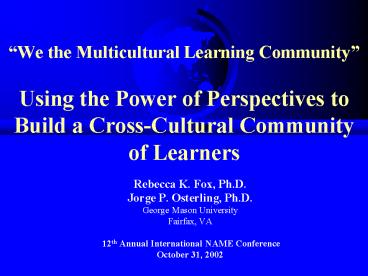- PowerPoint PPT Presentation
1 / 29
Title:
Description:
We the Multicultural Learning Community Using the Power of Perspectives to Build a Cross-Cultural Community of Learners Rebecca K. Fox, Ph.D. – PowerPoint PPT presentation
Number of Views:30
Avg rating:3.0/5.0
Title:
1
We the Multicultural Learning Community
Using the Power of Perspectives to Build a
Cross-Cultural Community of Learners
- Rebecca K. Fox, Ph.D.
- Jorge P. Osterling, Ph.D.
- George Mason University
- Fairfax, VA
- 12th Annual International NAME Conference
- October 31, 2002
2
Action Research Projectin a Multicultural
Teacher Education Program
- Report on Emergent Results Lessons Learned
from a Qualitative Study - George Mason University
3
Session Objectives
- Report on Ongoing Research Study
- Share information about strategies used in
retooled graduate course to help teacher
candidates develop cross-cultural competence - Promote a 21st Century philosophy that teachers
must become cultural brokers - Promote collaboration, discussion among attendees
about best teacher education practices that
foster equity for all learners
4
Todays Agenda
- Background of the Study
- Overview
- Research question
- Strategies used to create a cross cultural
community of learners. - Examples
- Results
- Dialogue questions and discussion.
5
Background
- Impetus for the study
- Co-teaching opportunity
- Major demographic changes
- USA Greater Washington Metro Area
- Graduate Student Population
- Challenge and opportunity to re-tool
- Required first-semester graduate course
- Opportunity for professional growth
6
Research Site
- Graduate School of Education
- George Mason University
- Fairfax, VA
7
Longitudinal Project Stages
- Action research project conducted during 2001
Fall Semester in EDCI 516 Bilingualism and
Language Acquisition Research - Follow-up research on study participants
learners in their PK-12 classrooms. - Emergent and ongoing recommendations for
programmatic growth and change.
8
EDCI 516 Bilingualism and Language Acquisition
Research
- Course Description
- Provides students with a knowledge of L1 L2
acquisition, including the interaction of a
bilinguals two languages with implications for
the classroom. - Required course for Virginia State PK-12 ESL/FL
licensure and for foreign language immersion
teachers.
9
Vygotskys Contribution Zone of Proximal
Development
- Lev Semenovich Vygotsky (1896 1934).
- Social interaction plays a fundamental role in
the development of cognition.
10
Freires ContributionThe Teacher as a Learner
- Paulo Freire
- (1921 1997 )
- The importance of the interaction of teaching
with learning on a dynamic and ongoing dialogic
process. - One does not happen without the other.
- Dialogue demands respect for the learner and
his/her reading of the World.
11
Our Point of Departure - part 1
12
Our Point of Departure - part 2
13
Developing a New Lens
- Becoming part of a larger
- Community of Learners
14
EDUC 516 Learning Community
- Building and developing a dialogical learning
community composed of graduate students and
professors. - Challenges
- Opportunities
15
The EDCI Learning Community
- CHARACTERISTICS
16
EDCI 516 Our point of departure
- Two professors of second language acquisition and
multi-cultural education - Teaching Bilingualism and language acquisition
research to polyglots - 28 polyglot students from romance to Asian
languages, from Arabic to Russian, including ASL
teachers working with students who come from
countries where English is not the native
language - 25 - 30 of the class composed of non-native
English speakers
17
Co-Teaching a Graduate Course
- Potential zone of conflict?
- An opportunity for collaborative teaching?
18
Our Learning Community
19
Solo Teaching Professor A
Osterling
20
Solo Teaching Professor B
Fox
21
Covering Part of the Whole GlobeProfessors
Contributions
Fox
Osterling
22
Students become teachersTeachers become learners
Fox
Osterling
23
Strategies Used
- Instructors jointly planned and presented.
- Technology
- Blackboard-5 Instructional Platform
- PowerPoint guides for major topics
- Multiple intelligences/ learning styles theory
- Guest speakers
- Literature and narratives
- Funds of Knowledge theory
- Group projects
- Small group hands-on collaboration
- Performance-based course products language
analysis project - Written feedback/ evaluations
- Student socialization e.g., snacks at break ,
potluck dinner.
24
Results of the Research
- 1. A community where everybody teaches and
everybody learns.
25
Results
- 2. The power of modeling negotiation and
experiential learning in the preparation of
teachers for the 21st Century - Skill building through experiences
- All participants have a voice
- A respect is built out of and for all
26
Results
- 3. The importance of on-going formative and
summative assessment along the continuum of the
semester - help to draw conclusions
- provide opportunities for synthesis
- essential for constructivist learning approach
and for scaffolding
27
Results
- 4. Technology supplied an essential community
building element - discussion strands (Santiago and other topics
drawn from weekly readings) - power point guides to course themes
- postings from Krashen, Unz, and NCBE Newsletter
provide current context - emails and announcements facilitate course work
and communication
28
Results
- Open atmosphere lowers affective filter
- Time for formal and informal social interaction
support collegiality and the philosophy of a
learning community
29
- We thank you for this rich opportunity to explore
another dimension in our teaching and learning. - It has been MOST enlightening!
- We look forward to hearing about your teaching
and continuing learning pathways, so please stay
in touch.































